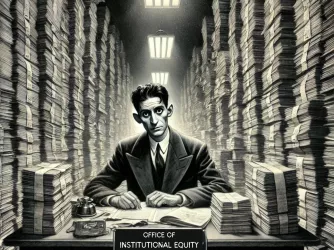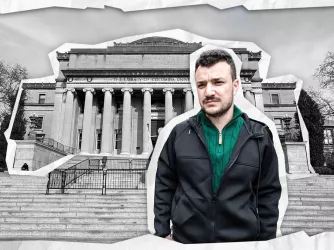Table of Contents
The ‘No Viewpoint’ Viewpoint

This article appeared in Inside Higher Ed.
Imagine a college student returning to campus next fall and being greeted by a student
government representative who asks her if she is devoutly religious or not. She answers “yes” and the representative responds, “I am sorry, the student government has decided that the separation of church and state means that, as state college, we have to be free of religious students. You may want to consider a religious college.” Next imagine this befuddled student taking her complaint to the president of the college and he says “Yes, I know the student government’s interpretation of the Establishment Clause is wrong and utterly violates the U.S. Constitution, but I don’t want to interfere with their autonomy. Besides this is a ‘teachable moment.’ If they eventually get this ‘no religious students on campus’ decision in front of me, however, I will veto it. In the meantime, have you considered a religious college?”
While I have seen abuses of the Establishment Clause almost as ridiculous as this in my career, I use the above example to illustrate the absurdity of a public college delegating students’ constitutional rights to the student government. In cases across the country, however, administrations have stood idly by while student governments pass rules and make decisions that flatly violate the Constitution. One recent case that demonstrates this phenomenon involves the University of Wisconsin at Eau Claire, where the student government passed a rule in March banning groups with a “particular ideological, religious, or partisan viewpoint” from receiving student-fee funding.
This may not seem like a particularly big deal to some. What the students and many observers don’t seem to understand is that profound moral and constitutional principles are violated by this rule.The case no one seems to have adequately explained to these students is the 2000 U.S. Supreme Court case Board of Regents v. Southworth. In that case a group of students (also at the University of Wisconsin, in that case at Madison) objected to the mandatory student fee because much of the money — money they were forced to pay in addition to their tuition — went to support groups they fundamentally disagreed with. This is a serious civil liberties concern. As bad as it may be to tell citizens what they can’t say, it is far worse to tell them what they must say, and perhaps worse still to tell them they must directly fund groups that they fundamentally oppose. Why, for example, should pro-life students be forced to give money to pro-choice student groups, or gay students be forced to give money to groups that believe homosexuality is sinful?
The Supreme Court in Southworth, however, did not see this as forced support of other’s opinions as long as certain conditions were met. In this unanimous decision, Justice Kennedy argued that, while people should not be forced to directly subsidize speech they despise, the student-fee system was more akin to a subsidy of free speech for all students in general — as long as the collected funds were distributed without regard to the viewpoint of the student groups. The decision was a kind of constitutional compromise: public colleges may collect mandatory student fees if, and only if, student groups of every opinion (or no opinion at all) could apply for funds on an equal basis. While colleges would have every right to set up “viewpoint-neutral” criteria for funding, like requiring a certain number of students to be a members before being recognized or only funding on-campus events, the fact that students or administrators did not like the message of particular student group could not be used to deny a group funding from the mandatory student-fee pool.
Other options are also open to public colleges under Southworth. Public colleges can, for example, eliminate student fee funding altogether, or they can designate its use for narrow content-neutral categories, like designating fees exclusively for intramural sports, or monthly social events. The analysis gets trickier if a college with mandatory student fees banned groups with formal ties to outside political groups like the College Republicans or the College Green Party.
In order to stand a chance of surviving a Southworth challenge, the college would likely have to ban funding for all groups associated with outside organizations (a tricky and difficult standard to administer, that would doubtless prevent many students from forming the groups they would prefer to form) but even doing that would not rule out the chance of a lawsuit. Anytime administrations, and, in particular, student governments are empowered to take the content of a group into consideration the possibility of such a standard being used against groups with unpopular viewpoints (and, thereby, violating Southworth) presents itself.
Unfortunately Southworth’s requirement of “viewpoint neutrality” is often badly misunderstood and the Eau Claire student government has turned the concept completely on its head. Over the past year the student government and some members of the student media have interpreted “viewpoint neutrality” as meaning that they could not fund student groups that had any particular viewpoint or “bias.” As part of growing trend coming from both the left and the right to route out “bias” on campus, a ranking student representative was even quoted in Eau Claire’s student newspaper as saying, “We want to exclude any groups that would be religious in nature, political in nature or anything that would have a political agenda [from being funded through student segregated fees].”
This statement directly contradicts numerous binding Supreme Court cases, including Southworth and Rosenberger v. Rector & Visitors of the University of Virginia, and flatly discriminates against both religious and secular viewpoints. Why didn’t the administration offer some guidance to the students? After all, the student government was publicly contemplating passing a rule that violated the U.S. Constitution for months.
The Foundation for Individual Rights in Education wanted to know why the administration was allowing their students to flounder and then flout the Constitution so blatantly, so it wrote the president and the upper administration. In an April 6 letter, FIRE emphasized a point that should be clear to any high school civics class: “As a state institution, the university and its administrators should understand that UWEC has a non-delegable duty to ensure that the First Amendment rights of its students are protected, and that no federal, state, local, or university rule, policy, or regulation can trump the exercise of rights guaranteed by the United States Constitution.” FIRE received a belated reply from the general counsel that allegedly the policy was “not yet in effect” and was pending review by her office, which would guide the university to deal with the policy in compliance with Southworth.While this gives some hope that the rule will eventually be overturned, during the previous fall the student government refused to recognize a student magazine called The Flip Side because of its “progressive bias.” The new, highly unconstitutional, regulation passed on March 14, 2005. The students have been laboring under the viewpoint that strong points of view are bad for months now. What exactly is the administration waiting for?
In previous situations where student governments have attempted to limit the free speech rights of other students, like University of Oregon where the student government stripped a student magazine’s recognition for poking fun at a transgender student representative who asked to be referred to as “zi” or “hir” rather than gendered pronouns like “he” or “her,” administrators essentially argued that that they did not want to interfere with the autonomy of the student government. While respect for the democratic process is commendable under some circumstances, one of the basics of our democracy is that there are some rights we deem too important to vote away. That is the reason why we have a Bill of Rights. The importance of the autonomy of the Eau Claire student government does not exactly match in importance the protection of free speech principles.
Some of the students seem to genuinely misunderstand the law here, and due to this misunderstanding they are violating the U.S. Constitution. As soon as administrators found out about this debate they should have informed the students that their interpretation of “viewpoint neutrality” was not just wrong but unlawful. Instead they have allowed student groups and the student government to fight it out among themselves with no apparent effort by the administration to defend the groups that were faced with these unconstitutional criteria.Meanwhile students write editorials interpreting Southworth to mean “student fees could only be used to fund content-neutral organizations.” If this is one of those “teachable moments” that educators talk so much about, it has failed. It is time the Eau Claire administration — and other universities where student harbor similar misunderstandings — do their job and teach their students what “viewpoint neutrality” really means.
Recent Articles
FIRE’s award-winning Newsdesk covers the free speech news you need to stay informed.

Navigating the Kafkaesque nightmare of Columbia's Office of Institutional Equity

A picture is worth a thousand words — unless a college district bans it

Intimidating abridgments and political stunts — First Amendment News 461
